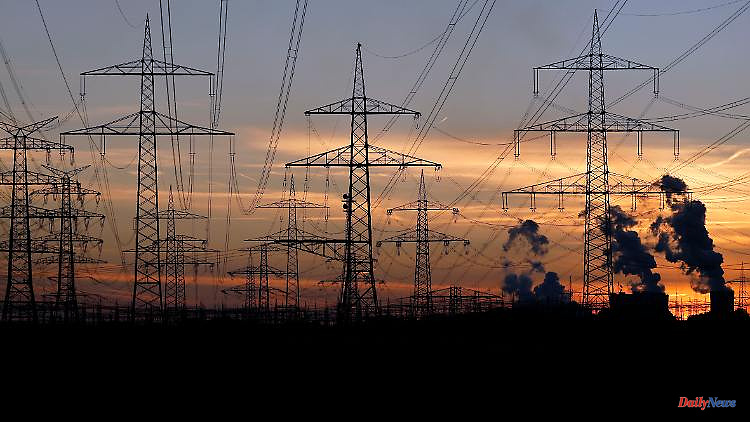In addition to the rapidly increasing gas price, the electricity price is now also skyrocketing. The lack of electricity in France is largely responsible for this. But a price cap like in the neighboring country is not the solution - but the cause of the problem, says energy economist Claudia Kemfert in an interview with ntv.de.
ntv.de: Electricity from gas-fired power plants accounts for less than 15 percent of all German electricity production. And yet the gas price is dragging the electricity price into new dimensions. Why?
Claudia Kemfert: The electricity prices on the exchange are currently exploding, also because we have the so-called merit order principle. The most expensive border power plant determines the price. At the moment it is the gas-fired power plants that are driving up the price of electricity on the exchange. However, the skyrocketing price of electricity is also an expression of a functioning market. Because the price is formed by supply and demand.
But right now there isn't a power shortage, just a gas shortage, right?
In fact, we don't currently have any bottlenecks in Germany, but we do in France. There, more than half of the nuclear power plants are not connected to the grid due to lack of maintenance and climate change. The scarcity is exacerbated by the high demand for electricity, because electricity prices are kept artificially low by subsidies. A fatal situation that must be changed quickly.
Why does France influence the German electricity price?
We wouldn't generate so much gas in Germany if France didn't have the electricity problems. Because they have a bottleneck at the moment, they import our electricity, which is also generated from renewable energies, but currently mainly from gas. And that ensures that the price goes through the roof here too.
Why is gas still used to generate electricity?
Because we still don't have enough renewable energies to largely do without them in power generation. In addition to electricity, gas-fired power plants often produce heat as well. If we hadn't slowed down the energy transition, we would only be helping France with our renewable energies.
Price fluctuations on the stock exchange are not uncommon. How does this affect consumer bills?
The exchange electricity price is only one component of the end customer price, it currently accounts for almost 45 percent of the end customer price, about 25 percent are network fees, the rest are taxes and levies. Factors that increase electricity prices are always passed on immediately, it has always been like this. Price reductions are - if at all - passed on with a time delay. Very high profits are currently being made, especially by companies that produce the electricity and can sell it at high prices. Very few companies obtain the electricity they sell from the electricity market.
So some companies let consumers pay for extreme profit increases?
Yes, this is the case for most companies these days. Either an excess profit tax must be introduced here, which is paid back to the affected households and companies. Or the electricity companies have to be forced by public pressure not to pass on the price increase in full - especially if they produce the electricity themselves and do not have to buy it expensively.
Economics Minister Robert Habeck wants to fundamentally reform the electricity market and decouple the gas price from the electricity price. Would that lower expensive electricity prices?
In fact, there is no coupling between gas and electricity prices, but a market price mechanism on the exchange. Actually, the electricity market works well. Currently, the most expensive power plant is the gas power plant and determines the price of electricity. That does not have to be that way. If we have enough capacity in the market and gas power plants are not used as heavily to meet demand, the merit-order curve would move back towards cheap energy supplies.
In France, the price of electricity is capped so that the high prices are not passed on to consumers. Would that also be a solution for Germany?
A price cap is currently the worst possible way. A cap means that households with low electricity prices are subsidized, so there is no incentive to save energy. That's why demand isn't going down. But that would be urgently needed, especially now that there is less supply. It is also extremely expensive because the French state has to compensate for these high prices with subsidies.
An alternative that is being discussed in Germany is an upper limit, but only for basic services. Would that be a realistic alternative to the French model?
I don't think it makes sense to cap the basic supply of gas and electricity. Because at the moment we have these bottlenecks, both with gas and with electricity. And that's why it's important that we get price signals. We have to take countermeasures elsewhere. We can only do that by taking the financial burden off households and companies, through payments, incentives and ways to get away from high consumption. It is not prices that need to be capped, but costs.
The government announced such financial relief through direct payments after its meeting today. So is this a reasonable solution?
It makes more sense than capping the price of electricity. Direct payments are reasonable, especially for the needy, for low earners, for people or households, businesses that actually need it.
That helps the end user, but it doesn't solve the current electricity shortage.
Only the expansion of renewable energies can help.
Isn't that a long-term solution?
no In the short term, there is potential for renewable energies in Germany that we are not exploiting. Just one example: 500 megawatts of solar systems are not connected to the grid in Germany because the certifications and permits are missing. Why regulate for solar systems at 70 percent? Wind energy and biomass can also produce more. That works immediately! And: if approval procedures and the processes weren't so complicated, everything could happen very quickly. We can build a liquid gas terminal in Germany in four months. If we can do that, we won't need seven years for a wind turbine, but a maximum of seven months. If you want, there are ways. If you don't want to, there are reasons.
Mit Claudia Kemfert sprach Clara Suchy












